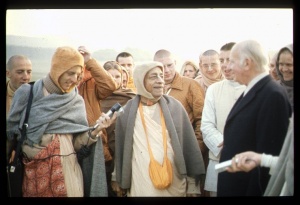SB 9.16.13: Difference between revisions
(Vanibot #0018 edit: make synonym terms in Sanskrit italic in SB - Vanisource) |
(Vanibot #0054 edit - transform synonyms into clickable links, which search similar occurrences) |
||
| Line 23: | Line 23: | ||
<div class="synonyms"> | <div class="synonyms"> | ||
''reṇukā'' | ''[//vanipedia.org/wiki/Special:VaniSearch?s=reṇukā&tab=syno_o&ds=1 reṇukā]'' — Reṇukā, the wife of Jamadagni; ''[//vanipedia.org/wiki/Special:VaniSearch?s=duḥkha&tab=syno_o&ds=1 duḥkha]-[//vanipedia.org/wiki/Special:VaniSearch?s=śoka&tab=syno_o&ds=1 śoka]-[//vanipedia.org/wiki/Special:VaniSearch?s=artā&tab=syno_o&ds=1 artā]'' — being very much aggrieved in lamentation (over her husband's death); ''[//vanipedia.org/wiki/Special:VaniSearch?s=nighnantī&tab=syno_o&ds=1 nighnantī]'' — striking; ''[//vanipedia.org/wiki/Special:VaniSearch?s=ātmānam&tab=syno_o&ds=1 ātmānam]'' — her own body; ''[//vanipedia.org/wiki/Special:VaniSearch?s=ātmanā&tab=syno_o&ds=1 ātmanā]'' — by herself; ''[//vanipedia.org/wiki/Special:VaniSearch?s=rāma&tab=syno_o&ds=1 rāma]'' — O Paraśurāma; ''[//vanipedia.org/wiki/Special:VaniSearch?s=rāma&tab=syno_o&ds=1 rāma]'' — O Paraśurāma; ''[//vanipedia.org/wiki/Special:VaniSearch?s=iti&tab=syno_o&ds=1 iti]'' — thus; ''[//vanipedia.org/wiki/Special:VaniSearch?s=tāta&tab=syno_o&ds=1 tāta]'' — O my dear son; ''[//vanipedia.org/wiki/Special:VaniSearch?s=iti&tab=syno_o&ds=1 iti]'' — thus; ''[//vanipedia.org/wiki/Special:VaniSearch?s=vicukrośa&tab=syno_o&ds=1 vicukrośa]'' — began to cry; ''[//vanipedia.org/wiki/Special:VaniSearch?s=uccakaiḥ&tab=syno_o&ds=1 uccakaiḥ]'' — very loudly; ''[//vanipedia.org/wiki/Special:VaniSearch?s=satī&tab=syno_o&ds=1 satī]'' — the most chaste woman. | ||
</div> | </div> | ||
Latest revision as of 23:45, 18 February 2024

His Divine Grace
A.C. Bhaktivedanta Swami Prabhupada
A.C. Bhaktivedanta Swami Prabhupada
TEXT 13
- reṇukā duḥkha-śokārtā
- nighnanty ātmānam ātmanā
- rāma rāmeti tāteti
- vicukrośoccakaiḥ satī
SYNONYMS
reṇukā — Reṇukā, the wife of Jamadagni; duḥkha-śoka-artā — being very much aggrieved in lamentation (over her husband's death); nighnantī — striking; ātmānam — her own body; ātmanā — by herself; rāma — O Paraśurāma; rāma — O Paraśurāma; iti — thus; tāta — O my dear son; iti — thus; vicukrośa — began to cry; uccakaiḥ — very loudly; satī — the most chaste woman.
TRANSLATION
Lamenting in grief for the death of her husband, the most chaste Reṇukā struck her own body with her hands and cried very loudly, "O Rāma, my dear son Rāma!"